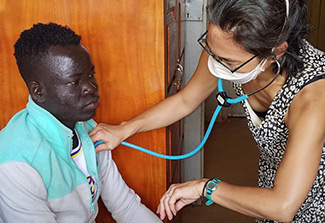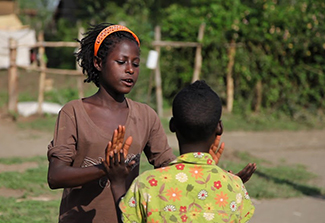Evaluating meningitis causes among patients in northern Uganda
July / August 2022 | Volume 21 Number 4
In northern Uganda, little is known about meningitis—its specific causes, the number of people affected, the impact of prevention measures. Meningitis is an infection and inflammation of the fluid and membranes around the brain and spinal cord caused by viruses, bacteria or fungi. Dr. Abigail Link became interested in how cryptococcal (fungal) meningitis (CM) was diagnosed and treated in the region when a scientist friend visited her in Lira, where she worked as a lecturer. “Here in the north, if the hospital is out of stock, costs are basically shifted to patients. Those who can't afford the diagnostic test or medication don't get treated,” explained Link.
Seeing this gap, her former colleague, Dr. Paul Bohjanen, who had been researching CM in Kampala, helped start a program where Lira patients could get treated even if unable to pay. “For my Ph.D. dissertation, I helped analyze that program. What we found is about half of the patients with symptoms did not have a diagnosis of CM.” An opportunistic infection that afflicts people living with HIV, cryptococcal meningitis symptoms include fever, intense headache, stiff neck, nausea, vomiting, sensitivity to light, drowsiness and confusion.
Link decided to continue this research for a Fogarty project by answering the question: If not CM, what other types of meningitis are making these Ugandan patients sick? Using data from a regional hospital, she will determine disease causes and conduct surveys and interviews with both patients and providers to understand their experiences as well as the barriers to improving health outcomes. “We're in the middle of that right now, enrolling patients in the program, and, come September, we’ll do a preliminary analysis,” she said.
 Courtesy of Abigail Link In Lira, Uganda, if the hospital is out of stock, costs are shifted to patients. Dr. Link and her colleague, Dr. Paul Bohjanen of University of Rochester Medical Center, helped start a program where patients could get treated even if unable to pay.
Courtesy of Abigail Link In Lira, Uganda, if the hospital is out of stock, costs are shifted to patients. Dr. Link and her colleague, Dr. Paul Bohjanen of University of Rochester Medical Center, helped start a program where patients could get treated even if unable to pay.
COVID-19 delays prevented her from completing her project in 2021 as planned. Though a disruptive force, the pandemic also brought unexpected insight. “I learned how much I can rely on the people on the ground,” she said. Though her work is ongoing, Link already has published an evaluation of cryptococcal meningitis cases. She also plans to further train her team, which now includes a manager, three nurses and three medical officers, to help collect and analyze new data. “They’ve begun to see the fruits of their labor in the form of findings from the patients that have come in over the past five to six years.”
Working in Lira prior to her Fogarty project helped her “get buy-in and partners because people have seen me here for the past five years in different roles. In any society it's about making connections so that was definitely advantageous for me,” said Link.
 Courtesy of USAID in Africa A sister and brother, who nearly died of a combination of malaria and meningitis, play together.
Courtesy of USAID in Africa A sister and brother, who nearly died of a combination of malaria and meningitis, play together.
Fogarty’s staff and project management lessons taught her much-needed organizational skills. She also praised the networking opportunities provided by Fogarty. “Other fellows working in your same country can be great guides and mentors. I’ve asked other Ugandan researchers, ‘I'm thinking about this for a project — what kind of cultural differences should I be aware of?’” Most of all she appreciated the amount of time provided by a Fogarty fellowship. “Unfortunately, we global health researchers tend to form a research question based on what we feel is the need. But it’s more important to interact with the people and understand what gaps they see.”
Looking to the future, Link plans to apply for NIH funding to “develop a mental health screening tool that will be implemented in HIV clinics in Lira.” She also plans to collaborate with Lira University on a training grant. “I chose nursing versus medicine because I wanted to have quality time with patients and take on the role of a caregiver versus the role of a person who diagnosis and prescribes,” said Link. She hopes her time spent in Uganda imparts sustainable change. "If I can do that through relationships I create, then at the end of the day I can feel like I accomplished something.”
More Information
Updated August 10, 2022
To view Adobe PDF files,
download current, free accessible plug-ins from Adobe's website.
Related Fogarty Programs
Related World Regions / Countries